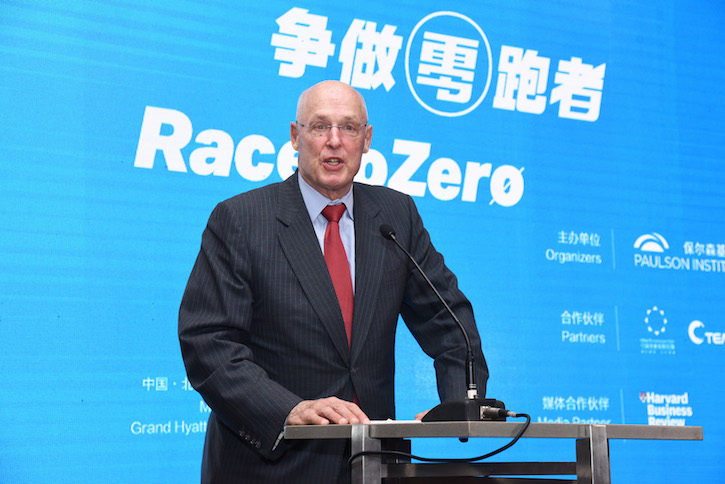
By Henry M. Paulson, Jr.
Earlier in my career, I would often hear from business leaders that environmental responsibility was a worthy goal, but hardly a strategic priority. In the name of corporate social responsibility, they might take some measure to “green” an aspect of their business, often on the margins of their core operations.
Today, that view is being turned on its head. More and more CEOs are recognizing that environmental stewardship is a smart business strategy that brings with it increased efficiencies and cost reductions. And for many companies, eschewing sustainable business practices means falling behind.
That’s why last week the Paulson Institute, in partnership with CCIEE, launched “Race to Zero,” a new campaign that supports companies as they make commitments to reduce emissions and waste across their operations, particularly in China. Ultimately, the campaign aims to get companies to do their part in the global transition to a low-carbon economy.
I’ve worked with thousands of different companies throughout my career at Goldman Sachs, the U.S. Treasury, and the Paulson Institute. What I’ve learned is that the strongest global companies are those that invest wisely for the future by thinking long-term, and are responsible actors toward people and the environment.
This was reinforced during the Race to Zero launch last week, where some of the world’s largest and most influential companies announced new commitments to reduce emissions and waste in their operations. Alibaba, for example, plans to adopt environmentally friendly packaging for 50% of its packages. Honeywell is setting a China-specific goal of a 10% improvement in GHG emissions by 2022. Other meaningful and ambitious company commitments can be seen at joinracetozero.org/companies.
To be clear, leading global companies are committing to new sustainability goals not just because it makes for good PR, but because they believe it an imperative for their business to do so. They recognize that environmental stewardship and climate risk mitigation are mainstream business issues. In my view, they have good reasons to think so.
It’s clear that investing in clean technologies of the future is absolutely prudent for companies to stay competitive—especially in China. Consider that the green market in China could be worth nearly $1 trillion by 2020, and over the next five years, China is expected to pour some $800 billion of public and private sector investment in clean energy industries.
Moreover, the risks companies and their suppliers face from physical climate impacts are real. So is the risk of not acting to invest in low-carbon, low-waste solutions when the world is increasingly moving in that direction. Those companies that act now will gain a strong competitive advantage over those that sit on the sidelines.
The bottom line is that companies that embrace sustainable business practices can create new, green, market opportunities. They can cut costs and save money. And as the world races towards a greener economy, they can ensure they don’t get left behind.
Henry M. Paulson, Jr., is Chairman of the Paulson Institute.


